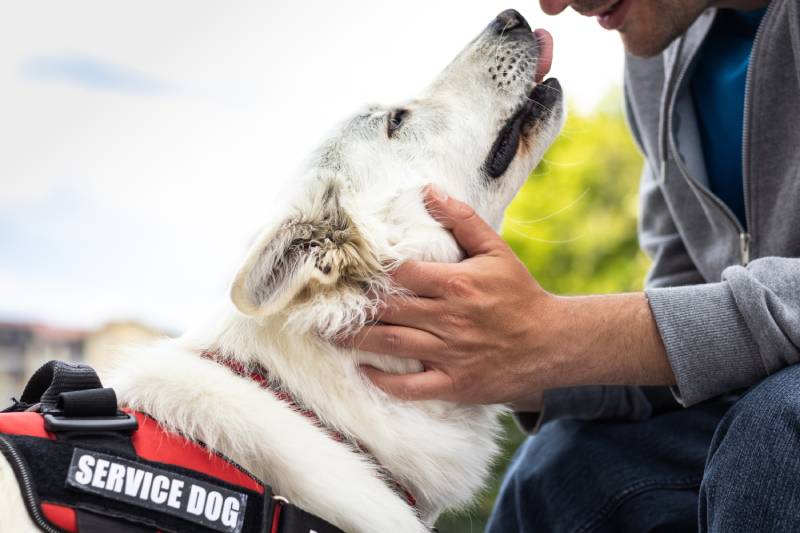Service animals perform a wide range of duties to help their handler with a disability. One of the most commonly employed service animals are psychiatric service dogs. These dogs are specifically trained to help a handler with a psychiatric disability. They perform tasks ranging from providing deep pressure therapy to guiding a disoriented handler, to interrupting harmful behaviors.
Our article will cover everything about what psychiatric service animals do to benefit their handler and give a detailed overview of psychiatric service dog training.
What Does a Psychiatric Service Dog Do?
Psychiatric service dogs are remarkable assistance animals that help individuals with psychiatric disabilities in numerous ways. Here are some of the ways a psychiatric service dog can assist their handler.
- Deep Pressure Therapy: Psychiatric service dogs provide deep pressure therapy to help the handler calm down when overwhelmed due to conditions like anxiety and dissociative disorders.
- Reminding Medication: Any service animal can bring medication, but psychiatric service dogs are also trained specifically to fetch their handler’s medication during an episode, such as a panic attack or seizure.
- Guiding: Psychiatric service animals can be trained to help individuals who may get disoriented or confused due to their condition find their way and lead them to a safe place.
- Interruption: Psychiatric service dogs can identify and interrupt harmful behaviors. For example, they can recognize the handler with OCD engaging in harmful behaviors and interrupt them. Psychiatric service dogs can also be trained to bring specific objects and items to help the handler redirect their behavior.
- Blocking People: Psychiatric service dogs trained to help an individual with social anxiety or autism can place their body against other people to prevent them from getting too close to make social situations more comfortable for the handler.
These are just a few examples of how psychiatric service animals help their handlers. Depending on the handler’s condition, psychiatric service dogs can learn many more commands to improve the handler’s quality of life and ensure their well-being.
Can I Train My Dog to Become a Psychiatric Service Dog?
While training a dog to perform specific tasks to help an individual with a psychiatric disability is certainly possible, it’s worth noting that service animal training, regardless of the kind, is an intensive process that requires expert training, time, and effort.
If you want your dog to perform a specific thing, such as one of the tasks listed above, it is possible to train your dog with enough patience, commitment, and following appropriate training resources.
When training your dog at home to perform tasks related to psychiatric service dog work, it is crucial to utilize reliable training resources prepared by experts to ensure the speed and quality of the training.
However, considering how crucial the tasks are that psychiatric service animals perform, those inexperienced with dog training should leave it to a professional. There’s also no guarantee that your dog will have the required temperament to become a psychiatric service animal.
With these in mind, it is best to consult a professional dog trainer to assess your dog’s temperament and suitability for psychiatric service dog training based on what you need your dog to perform. After an initial assessment, the dog trainer can inform you about the possibility of training your dog for psychiatric service animal work.
Understanding Psychiatric Service Dogs and Training
Psychiatric service dog training is a serious topic, considering how vital the tasks these dogs perform for their handler. A psychiatric service dog must be reliable and ready to perform the tasks they’re trained in any circumstance, anywhere, at all times. If they get distracted and lose focus, it can leave the handler helpless.
Due to this, training a psychiatric service animal shouldn’t be taken lightly. If you’re an experienced dog owner and have the availability to train your dog, you can invest in appropriate psychiatric service dog training and train your dog yourself.
Those inexperienced with dog training should reach out to a professional dog trainer and ask about their programs for psychiatric service dogs. While learning along the way is certainly possible, seeking help from a professional dog trainer is the best way to ensure you will have a reliable, well-trained psychiatric service dog.
Lead Image Credit: 24K_Production, Shutterstock.

Leave a Reply